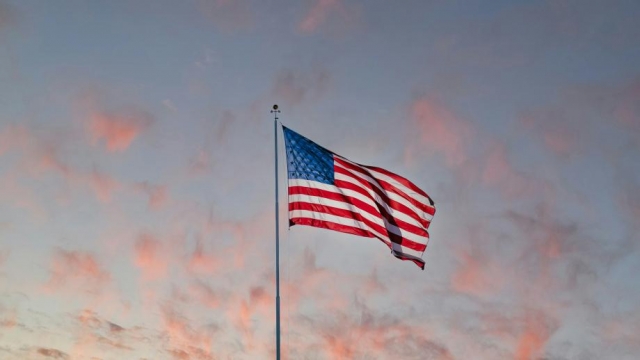Opinion: Australia's enduring love affair with the US is at a critical point

By Mark Kenny
A version of this article was originally published by The Canberra Times.
Few stories start in a more compelling way than Ian McEwan's brilliant novel Enduring Love (1997).
Several men, strangers to each other, rush across an English field converging on a stricken helium balloon as they try frantically to hold it grounded long enough to free a child cowering in its basket.
As the ungainly apparatus is gusted violently aloft during a wind squall, the men suddenly find themselves "treading air", each facing a terrible choice - whether to hang on in the hope their collective weight will bring it down again or let go before rising too high to survive the fall.
It might seem rich to describe Australia's umbilical attachment to the United States as an enduring love, but that unanswerable question in the untethered balloon scene feels disturbingly apt.
As does the book's title. The bilateral relationship has survived long enough to natural, even definitional. With that "enduring", though, has come less admirable attributes like unbalanced, fawning, and captive.
Hence the reckless conservative boast that Australians have fought alongside Americans in every war they've undertaken since 1900. This includes moral, legal, and strategic outrages like Vietnam, Iraq and Afghanistan.
Like McEwan's disparate characters twisting precariously on guy ropes and slaves to untameable forces of physics, the existential question of whether to cling on or let go, is fast becoming existential.
Not that the cheerleaders of the AUKUS caucus are awake to it. While the US talks openly of rehabilitating Russia, invading Greenland and seizing the Panama Canal, they mouth terms like strategic alignment, shared values, cooperation and interoperability.
In so many ways, McEwan's exquisitely described dilemma seems like a fitting metaphor for this instant. A temporally reflexive metaphor that works, albeit in different ways, for Australia, for Iran, for Israel, and even for those democracies keeping schtum as another American president contemplates a Middle Eastern war. And as Israel reveals its bottomless reserves of military power and lawless vengeance.
In short order, Iran must decide if it is to surrender its nuclear enrichment capacities - even for exclusively peaceful domestic purposes like medical isotopes - or face a US aerial bombardment of unimaginable ferocity.
Israel must decide, in the same compressed timeframe, if it is to accommodate such assurances - should Donald Trump insist(?) - or fight on condemning Israelis to further carnage and the state itself to perennial insecurity in its region. It is a choice between an unlikely peace and the guarantee of endless war and an ever-enduring hate.
The oafish Trump has no plan. He has bought himself a mere fortnight to decide between backing off or pursuing a path he expressly campaigned against.
McEwan's well-meaning strangers who've sprinted towards the flailing balloon exhibit some characteristics of the international community. In the nine days since Israel's far-right Netanyahu government began bombing Iran's nuclear sites without warning, a kind of uncoordinated helplessness has taken hold.
Those gathered in Canada for the G7 caved instantly to US and Israeli pressure, citing the Jewish state's limitless "right to defend itself". The group called Iran the "principal source of regional instability". While the criticism of Iran is justified, one might have expected the top liberal states to weigh more heavily the authoritative opinions of international legal scholars such as Professor Ben Saul, Challis chair of international law at the University of Sydney and UN Special Rapporteur on Human Rights and Counter Terrorism.
Saul says Israel's claimed legal impunity simply does not apply here.
"Israel claims that its attack is necessary to prevent Iran acquiring nuclear weapons and using them in the future. The problem is that under international law, a country may only defend itself from an actual or imminent armed attack by another country," wrote Saul in the Guardian.
As the rules break down, such facts have become ethereal, prone to dissipating, like so much helium.
It is worth remembering that the trend to American unreliability now so blatant, started more than two decades ago, when fragmentary intelligence was deliberately "sexed up" to look like solid intel ahead of the Iraq invasion. America's "forever wars" in Iraq and Afghanistan, with the attendant abuses of Abu Ghraib and the eventual surrender to the very Taliban it had expelled - signalled a loss of prestige internationally. But they also sparked a crisis at the moral and institutional core of America. The nativist, protectionist, anti-establishment Trump is its indignant progeny. A vulgar up-yours to the compromises of democracy and the checks on executive power by laws, courts, multilateral bodies and international norms.
As Hugh White notes in his latest insightful Quarterly Essay, "Hard New World: Our Post-American Future", the nation which had saved democracy, then created and policed a post-war rules-based international order, has gone and is not coming back.
Now, an avowed America First isolationist scoffs at such an order (globally and domestically) and ridicules the haughty ethics that had underpinned it.
Even last week, Trump arrived at the G7 only to complain that Vladimir Putin should be there too.
To bend McEwan's balloon dilemma further, Australia might ask itself a further question: are we the poor sods clinging white-knuckled to guy ropes?
Or are we perhaps the panicked child cowering in the basket, too frightened to determine our own survival as a sovereign nation?
Mark Kenny is the Director of the ANU Australian Studies Institute and host of the Democracy Sausage podcast.








